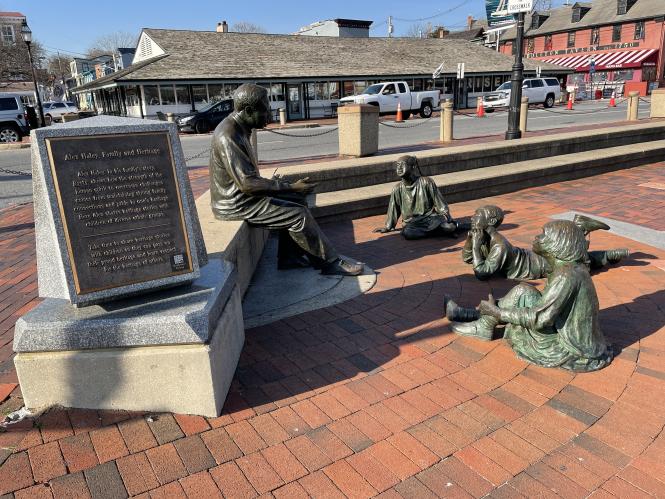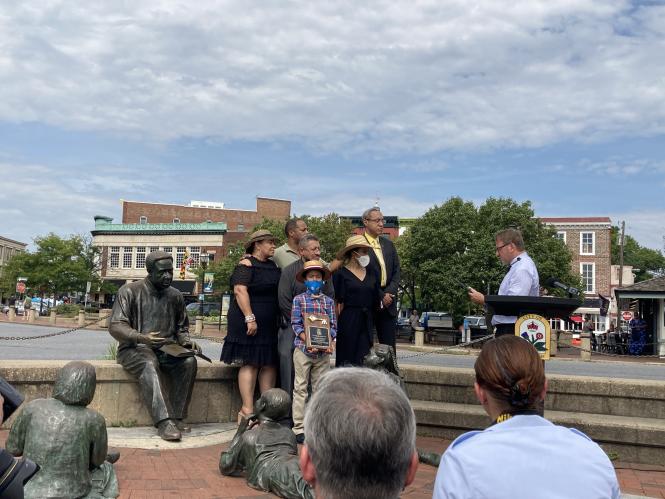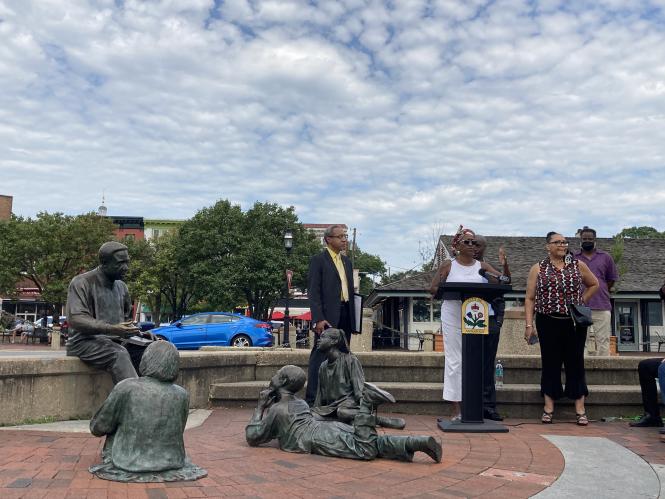Like most American cities rich in colonial history, Annapolis has its fair share of statues honoring white men who played a central role in it. A few of the most visible include one honoring Baron Johann De Kalb, a German-born Revolutionary War hero, outside the Maryland State House, and another honoring General George Washington, who resigned his commission as commander-in-chief of the Continental Army in the Old Senate Chamber, inside it.
History Unfolds
But unlike many American cities, Annapolis also memorializes many Black individuals who have made a pivotal, though often overlooked, impact on our history – from one statue honoring Thurgood Marshall, who in arguing Brown vs. the Board of Education, the landmark 1954 Supreme Court case that struck down “separate but equal” school segregation, and was the first African American appointed to the U.S. Supreme Court, to the newest statues in town, honoring the famed Black abolitionists Harriet Tubman and Frederick Douglass, in the State House.
 Alex Haley Memorial at City Dock in Annapolis.
Image courtesy of Annapolis Discovered.
Alex Haley Memorial at City Dock in Annapolis.
Image courtesy of Annapolis Discovered.
But the most visible, and likely the most photographed, statue in Annapolis and perhaps all of Maryland is the one found in the heart of downtown Annapolis: the Kunta Kinte - Alex Haley Memorial at City Dock.
Roots
Installed in 1992, the statue depicts three spellbound children being read to by Haley, a journalist and author best known for writing Roots, the Saga of an American Family, a Pulitzer Prize-winning book and Emmy, Golden Globe, and Peabody award-winning television mini-series that describes and depicts the life of Kunta Kinte. He was kidnapped in Gambia, enslaved and carried across the Atlantic Ocean, and sold at City Dock in Annapolis. While a placard that accompanies the memorial speaks to how Haley’s work shined a light on slavery’s significance to both America as a whole and Annapolis in particular, the statue itself represents the importance of discovering, sharing, and preserving African American history.
To further highlight this importance and honor Haley, the City of Annapolis proclaimed August 11th, his birthday, “Alex Haley Day” during a public ceremony in 2021 – the year when he would have turned 100.
“He was a trailblazer of the written word,” said Mayor Gavin Buckley, who presented the Key to Annapolis to Haley’s family, including Director of the Legacy of Slavery in Maryland at the Maryland State Archives Chris Haley. “Alex Haley’s ties to Annapolis are rooted in the most barbaric chapter of the American story. It was a story that needed to be told, and he was the one to tell it.”
 The Haley Family stands with Mayor Gavin Buckley to receive official Keys to the City
on August 11th, 2021, Alex Haley Day. Image courtesy of the author.
The Haley Family stands with Mayor Gavin Buckley to receive official Keys to the City
on August 11th, 2021, Alex Haley Day. Image courtesy of the author.
“The keys to Annapolis have always been its history and our culture,” Maryland State Delegate Shaneka Henson echoed in addressing the Haley family. “Annapolis is not just Thomas Jefferson and George Washington. It’s your ancestors and my ancestors. Your father and grandfather tied a cultural thread through our shared experiences. Because (he) told his story, told our story, we are able to proudly live as Annapolitans in the City that still stands today.”
Because years of genealogical research led Haley to discover that he was in fact a seventh generation descendent of Kunta Kinte, and helped inspire him to write the book, speakers also discussed the power of pursuing and discovering one’s personal history.
Alex Haley Day
“Alex Haley is the beginning of teaching us where we’re from,” said Janice Hayes-Williams, who studies the history of the Black community in Annapolis and recalled tracing her family back to Benin, as well as to a ship carrying enslaved people that landed in Annapolis.
 Historian and Genealogist Janice Hayes-Williams used Alex Haley's inspiration to trace her own
ancestors back to Benin, Africa. Image courtesy of the author.
Historian and Genealogist Janice Hayes-Williams used Alex Haley's inspiration to trace her own
ancestors back to Benin, Africa. Image courtesy of the author.
So yes, visit as many statues in Annapolis as possible, and perhaps taking an African American Heritage Tour specifically. But don’t forget to do the most important thing: read about who they depict, reflect on why, and try to remember and share that history. It’s something that Alex Haley would certainly hope for.
To learn more about Alex Haley, Kunta Kinte, and the Kunta Kinte - Alex Haley Memorial, visit https://kintehaley.org/ . To further discover the culture, history and art of the descendants of the African Diaspora- be sure to visit the Kunta Kinte Heritage Festival, Saturday, September 25, 2021.









